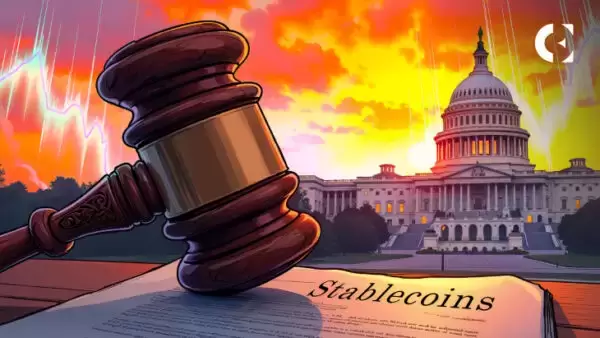 |
|
 |
|
 |
|
 |
|
 |
|
 |
|
 |
|
 |
|
 |
|
 |
|
 |
|
 |
|
 |
|
 |
|
 |
|
Cryptocurrency News Articles
Brussels Standoff on EU Cybersecurity Label Stalls Tech Giants' Ambitions
Apr 17, 2024 at 01:06 am
A draft EU cybersecurity label intended to certify the security of cloud services for government and corporate contracts is postponed due to disagreements among cybersecurity experts. The label, initially proposed in 2020, has faced objections over strict requirements for Big Tech companies to qualify for the highest level of certification. The current draft removes prior requirements for data storage and processing within the EU, drawing both support from Big Tech and criticism from EU cloud vendors and businesses. The final decision on the label lies with the European Commission after receiving opinions from EU countries.

Brussels Stalemate on EU Cybersecurity Label Thwarts Big Tech Ambitions
Brussels, Belgium - National cybersecurity experts have postponed a crucial vote on a draft EU cybersecurity label, casting a shadow over the ability of Amazon, Alphabet's Google, and Microsoft to qualify for lucrative cloud computing contracts with the European Union.
The European Union has been working to establish a cybersecurity certification scheme (EUCS) to guarantee the integrity of cloud services and guide governments and businesses towards secure and reputable vendors. However, the process has been hampered by intense debates over the level of scrutiny that should be imposed on Big Tech companies to attain the highest security rating.
A meeting of cybersecurity experts in Brussels failed to reach a consensus on the latest draft of the EUCS, proposed by the European Union Agency for Cybersecurity (ENISA) and modified by Belgium, the current holder of the rotating EU presidency. The lack of a vote has delayed the next steps in the approval process: an opinion from EU member states and a final decision from the European Commission.
The stumbling block lies in the stringent requirements previously proposed to ensure the highest level of cybersecurity. These provisions would have compelled US tech giants to establish joint ventures or collaborate with EU-based entities to store and process customer data within the bloc.
The removal of these sovereignty requirements has been met with mixed reactions. While Big Tech companies have welcomed the move, EU cloud providers and businesses, such as Deutsche Telekom, Orange, and Airbus, have raised concerns. They caution that the absence of these safeguards leaves EU data vulnerable to potential legal access by non-EU governments.
The EU cybersecurity label is seen as a crucial tool for strengthening the cybersecurity resilience of European organizations. It is anticipated to provide a clear and standardized framework for evaluating the security of cloud services, enhancing confidence and fostering innovation in the sector.
However, the ongoing debates and the postponement of the vote have cast doubt on the immediate implementation of the EUCS. It remains to be seen whether a compromise can be reached to address the concerns raised by both Big Tech and EU businesses.
The delay in the approval process has created uncertainty for companies seeking to secure EU cloud computing contracts. Amazon, Google, and Microsoft, which dominate the global cloud market, are eager to gain access to the lucrative opportunities presented by the European Union. However, without a clear path to certification, their ability to participate in EU tenders will remain limited.
The outcome of the ongoing discussions will have far-reaching implications for the development of the EU cybersecurity landscape. It will determine the level of scrutiny applied to Big Tech companies and shape the market dynamics for cloud services within the European Union. As the debate continues, the European Union faces the challenge of balancing the need for robust cybersecurity protections with the desire to foster innovation and economic growth.
Disclaimer:info@kdj.com
The information provided is not trading advice. kdj.com does not assume any responsibility for any investments made based on the information provided in this article. Cryptocurrencies are highly volatile and it is highly recommended that you invest with caution after thorough research!
If you believe that the content used on this website infringes your copyright, please contact us immediately (info@kdj.com) and we will delete it promptly.
-

- U.S. House Financial Services Committee Advances “STABLE Act” Aimed at Creating a Dedicated Framework for Stablecoin Regulation
- Apr 03, 2025 at 10:00 am
- The STABLE Act, designed to create a dedicated federal framework specifically for stablecoin regulation, has reportedly gained significant bipartisan support.
-

-

- Shocking footage has emerged of a woman cutting down a poster of independent Fowler MP Dai Le
- Apr 03, 2025 at 09:55 am
- Shocking footage has emerged of a woman cutting down a poster of independent Fowler MP Dai Le, saying she's doing so because the Vietnamese-Australian is a “Communist” and a “Muslim”.
-

-

-

-

-

- Elon Musk Resigns from Trump Administration, Sending Shockwaves Through Crypto and Political Spheres
- Apr 03, 2025 at 09:45 am
- In an unexpected and unprecedented development, tech magnate and billionaire entrepreneur Elon Musk has reportedly stepped down from his position in the Trump administration. This decision has sparked widespread reactions across financial markets, cryptocurrency platforms, and political circles worldwide.
-




























































